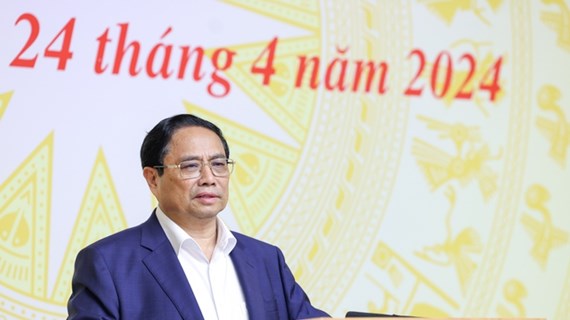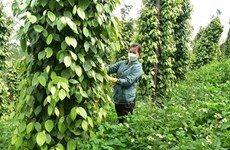ADB symposiums highlight regional challenges
A number of symposiums were organised in Hanoi on May 3 as part of
the ongoing 44 th Annual Meeting of the Asian Development Bank (ADB)
Board of Governors.
At the seminar on “Integration of the capital and finance markets, and harmonisation of management regulations in Asia in a post-crisis environment”, participants discussed the momentums and reasons for the incorporation of capital markets in Asia .
At the seminar on “Integration of the capital and finance markets, and harmonisation of management regulations in Asia in a post-crisis environment”, participants discussed the momentums and reasons for the incorporation of capital markets in Asia .
A number of symposiums were organised in Hanoi on May 3 as part of
the ongoing 44 th Annual Meeting of the Asian Development Bank (ADB)
Board of Governors.
At the seminar on “Integration of the capital and finance markets, and harmonisation of management regulations in Asia in a post-crisis environment”, participants discussed the momentums and reasons for the incorporation of capital markets in Asia .
They also debated the need to develop credit and bond markets as well as challenges to harmonising and regulating these markets in order to meet the region’s infrastructural and economic development demands.
The seminar, “Climate risk and resilience: securing the region’s future,” examined the threats posed by climate change to water and food security in the region and explored strategies to manage those threats.
Key solutions include scaling up efforts to “climate proof” infrastructure, managing disaster risks such as floods and droughts, and adopting regional food security strategies.
ADB estimates that a sustained 10 percent rise in domestic food prices in developing Asia , home to 3.3 billion people, could push an additional 64 million people into extreme poverty. Domestic food inflation in many countries in Asia averaged 10 percent in early 2011.
“If we do not fully grasp the interrelated issues of water, food, and climate change and address them head on, we may lose the hard-won gains in our fight against poverty,” said Ursula Schaefer-Preuss, ADB’s Vice President for Knowledge Management and Sustainable Development. “We must work together to make Asia and the Pacific more resilient to the impacts of climate change and ensure water and food security for all.”
At the seminar “Bridging the Gap: Catalysing Private Capital for Investment in Infrastructure”, delegates discussed the challenges that developing nations face to mobilise the world’s enormous pools of private savings and what development financing institutions must do to facilitate the flow of this capital.
The participants agreed that development finance institutions around the world should encourage greater use of risk-sharing models like public-private partnerships to ensure critical infrastructure gets built in developing countries. The institutions should do that by helping create the right regulatory and market environment and offering risk mitigation instruments to spur private capital.
ADB estimates Asia and the Pacific alone need 750 billion USD per year through 2020 to finance necessary infrastructure.
The seminar, “Social protection in the Asia Pacific region from the perspectives of workers, the youth, and the aged” looked at how social protection helps to ensure decent work for all, promotes the rights of children and their families, and provides income security and care for the growing ageing populations in the region.
Broader social protection will help the poor and vulnerable in Asia and the Pacific to break the cycle of poverty and enhance the quality of the region’s economic growth through better employment opportunities, increased productivity, and protection against economic shocks, participants heard.
Despite remarkable achievements, economic growth in Asia and the Pacific has been uneven with millions remaining vulnerable to economic, social, and environmental risks. The ageing population, urbanisation, and disintegration of family and community networks have contributed to increased social risks and inequalities.
The global economic crisis, coupled with food and fuel price increases, further highlights the need to protect the poor and disadvantaged from unemployment, illness and disability, and natural disasters.
“Hundreds of millions of people in Asia and the Pacific remain mired in extreme poverty or are vulnerable to crises, such as economic downturns, natural disasters, or severe illness,” said Ursula Schaefer-Preuss, ADB’s Vice President for Knowledge Management and Sustainable Development.
Since the global financial crisis, many Asian countries have adopted reforms to strengthen their contributory pension systems and better address the needs of groups not covered by formal social insurance. However, insufficient coverage and inadequate program benefits continue to be a key challenge, particularly for informal workers, women, youth and the elderly.
On the sidelines of the meeting, Governor of the State Bank of Vietnam (SBV) Nguyen Van Giau met with Jaejung Song, ADB Executive Director, and SBV Deputy Governor Dang Thanh Binh had a meeting with Ivo Distelbrink, Managing Director and Head of Global Treasury Services of the Bank of America./.
At the seminar on “Integration of the capital and finance markets, and harmonisation of management regulations in Asia in a post-crisis environment”, participants discussed the momentums and reasons for the incorporation of capital markets in Asia .
They also debated the need to develop credit and bond markets as well as challenges to harmonising and regulating these markets in order to meet the region’s infrastructural and economic development demands.
The seminar, “Climate risk and resilience: securing the region’s future,” examined the threats posed by climate change to water and food security in the region and explored strategies to manage those threats.
Key solutions include scaling up efforts to “climate proof” infrastructure, managing disaster risks such as floods and droughts, and adopting regional food security strategies.
ADB estimates that a sustained 10 percent rise in domestic food prices in developing Asia , home to 3.3 billion people, could push an additional 64 million people into extreme poverty. Domestic food inflation in many countries in Asia averaged 10 percent in early 2011.
“If we do not fully grasp the interrelated issues of water, food, and climate change and address them head on, we may lose the hard-won gains in our fight against poverty,” said Ursula Schaefer-Preuss, ADB’s Vice President for Knowledge Management and Sustainable Development. “We must work together to make Asia and the Pacific more resilient to the impacts of climate change and ensure water and food security for all.”
At the seminar “Bridging the Gap: Catalysing Private Capital for Investment in Infrastructure”, delegates discussed the challenges that developing nations face to mobilise the world’s enormous pools of private savings and what development financing institutions must do to facilitate the flow of this capital.
The participants agreed that development finance institutions around the world should encourage greater use of risk-sharing models like public-private partnerships to ensure critical infrastructure gets built in developing countries. The institutions should do that by helping create the right regulatory and market environment and offering risk mitigation instruments to spur private capital.
ADB estimates Asia and the Pacific alone need 750 billion USD per year through 2020 to finance necessary infrastructure.
The seminar, “Social protection in the Asia Pacific region from the perspectives of workers, the youth, and the aged” looked at how social protection helps to ensure decent work for all, promotes the rights of children and their families, and provides income security and care for the growing ageing populations in the region.
Broader social protection will help the poor and vulnerable in Asia and the Pacific to break the cycle of poverty and enhance the quality of the region’s economic growth through better employment opportunities, increased productivity, and protection against economic shocks, participants heard.
Despite remarkable achievements, economic growth in Asia and the Pacific has been uneven with millions remaining vulnerable to economic, social, and environmental risks. The ageing population, urbanisation, and disintegration of family and community networks have contributed to increased social risks and inequalities.
The global economic crisis, coupled with food and fuel price increases, further highlights the need to protect the poor and disadvantaged from unemployment, illness and disability, and natural disasters.
“Hundreds of millions of people in Asia and the Pacific remain mired in extreme poverty or are vulnerable to crises, such as economic downturns, natural disasters, or severe illness,” said Ursula Schaefer-Preuss, ADB’s Vice President for Knowledge Management and Sustainable Development.
Since the global financial crisis, many Asian countries have adopted reforms to strengthen their contributory pension systems and better address the needs of groups not covered by formal social insurance. However, insufficient coverage and inadequate program benefits continue to be a key challenge, particularly for informal workers, women, youth and the elderly.
On the sidelines of the meeting, Governor of the State Bank of Vietnam (SBV) Nguyen Van Giau met with Jaejung Song, ADB Executive Director, and SBV Deputy Governor Dang Thanh Binh had a meeting with Ivo Distelbrink, Managing Director and Head of Global Treasury Services of the Bank of America./.













